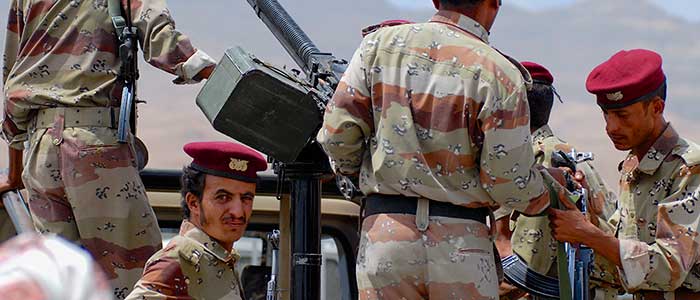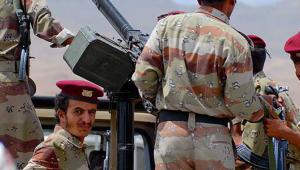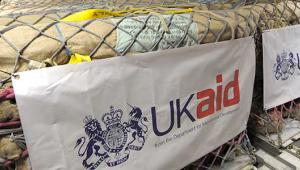Web_Yemen_iStock_000057482592_Large.jpg

Yemeni military soldiers
Giving evidence to the UK parliament’s international development select committee yesterday, Desmond Swayne and Tobias Ellwood rejected criticism of the sales.
Saudi Arabia began bombing Yemen in March last year in support of ousted Yemeni president Abd-Rabbu Mansour Hadi, leading to a massive intensification of violence in the country that has taken a heavy toll on the civilian population and public services. While the opposition to the Saudis, the Iran-backed Houthi rebels, are also guilty, the Saudi-led coalition is deemed responsible for the vast majority of civilian deaths.
Yesterday’s session heard from Save the Children, UNICEF, Oxfam and Saferworld, who said UK arms sold to Saudi Arabia are being used indiscriminately in Yemen – a violation of international law – resulting in thousands of civilian deaths or casualties, including almost 2,000 children in the last year.
Roy Isbister, head of Arms Unit at Saferword, said the scale of the UK’s material support for the Saudi military is “incredible”. For the first nine months of 2015 UK arms sales to Saudi Arabia totalled £2.95bn.
However, Swayne insisted that the work of the UK’s Department for International Development – which has spent £85m in aid for Yemen – had not been undermined by the sales, despite both the committee and NGO representatives describing this as a fundamental paradox.
He rejected the evidence given by the four NGOs and said a proper investigation into the allegations was required. As well as urging the UK to be more vocal in its criticism of airstrikes resulting in civilian casualties, the four NGO representatives also called for an independent investigation into the circumstances in Yemen – something that has been previously blocked by the UK and others.
Ellwood said a consensus had been reached that will see the Office of the High Commissioner on Human Rights conduct an investigation in coordination with the Saudi-backed Yemeni government.
He dubbed the Houthis a terrorist organisation and said if the Saudi-led coalition supporting the “legitimate Yemeni government” were to fail it would result in an even greater humanitarian disaster.
He continued: “You are being naive if you think Britain cannot sell weapons systems to its allies. We are legitimately allowed to do that.
“Saudi Arabia is entitled to defend itself, and under the UN security council resolutions, Saudi is allowed to participate [to support] the legitimate government of Yemen. Yes there are details about the way in which this war is being conducted that we must scrutinise.”
He added Britain has a strict arms export regime and does not just sell weapons by accident on eBay. So far, he said, Britain has been satisfied that there hasn’t been a breach of the conditions of those licenses.
However, NGOs told the committee that the UK’s justification for arm sales to Saudi Arabia is “fundamentally un-credible”.
Julien Harneis, head of UNICEF Yemen, told the committee the way the bombing was being conducted was “almost guaranteed” to result in civilian deaths and casualties.
He explained that in many areas all military targets have already been destroyed and bombing campaigns now target rebel leaders instead. Airstrikes are therefore conducted in residential areas packed with civilians, and Harneis said the sheer size of the munitions being used means that it is inevitable some will be killed or injured.
A United Nations report obtained by the Guardian and published yesterday also identified “widespread and systematic attacks” on civilian targets in Yemen including camps for internally displaced persons and refugees as well as schools, weddings and hospitals.
Overall, the panel documented 119 coalition attacks relating to violations of international humanitarian law. The panel also recorded three alleged cases of civilians fleeing residential bombings and being chased and shot at by helicopters.













